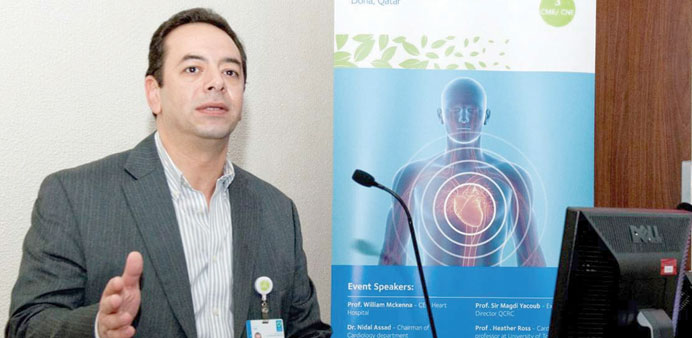Hamad Medical Corporation (HMC)’s Heart Hospital recently held Heart Failure Educational Day to highlight technological advances and state-of-the-art management techniques for patients with heart failure.
The daylong event was organised by the Cardiology Department at Heart Hospital and was attended by more than 150 participants, including cardiology physicians, specialists, residents, fellows, nurses and other allied health professionals.
Attendees had the opportunity to engage in discussions and update their knowledge on different methods used around the world to improve the quality of life for heart failure patients, with a special focus on introducing efficient management approaches to minimise recurrent hospital admissions.
Heart failure is a chronic, progressive condition in which the heart muscle is unable to pump enough blood to meet the body’s needs, resulting in occasional fatigue, shortness of breath and other symptoms that would prompt a hospital visit.
Dr Nidal Asaad, director of the Adult Cardiology Programme and senior consultant at Heart Hospital, said: “Heart failure patients are very unique patients. They have multi-system problems and require dedicated and prompt medical care. We have organised this day to ensure that all our staff members who are involved in providing care to these patients are well-educated and duly informed about current global trends in management.”
During the educational event, local cardiology experts delivered insightful lectures and dynamic presentations covering topics such as the role of imaging in heart failure diagnosis and management, tele-monitoring for patients with advanced heart failure, and cardiac devices used to manage heart failure patients.
Dr Amr Badr, consultant cardiologist and head of the Heart Failure Programme at Heart Hospital, said: “This event was an opportunity for us to share the achievements made under the Heart Failure Programme at the hospital. The programme was initiated two years ago to provide specialised care to advanced heart failure patients.”
Tele-monitoring was among the latest technologies highlighted at the event, which involves remotely monitoring a patient’s vital signs. “It is an innovative and promising approach in the care of people with heart failure. Tele-monitoring allows physicians to check how their patients are doing, while patients are within the comfort of their homes. This technique is designed to provide convenience to patients as well as physicians who can monitor the patients more efficiently,” Dr Badr explained.

Dr Amr Badr
